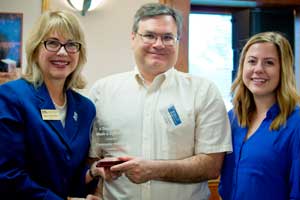Over more than 25 years Dr. Bollinger has taught a wide variety of courses including Introductory Microeconomics, Introductory Macroeconomics, Intermediate Microeconomics, Urban Economics, Business and Economic Statistics, and Econometrics I. However, his field area, Econometrics, has been the focus of most of his teaching. Currently Dr. Bollinger’s teaching rotation includes Economics 491 – Applied Econometrics, Economics 603 – Research Methods in Economics, and Economics 706 – Econometrics II.
Teaching

Teaching Philosophy
My overall teaching philosophy is that students learn best when the professor is excited about the material and happy to be there. I view teaching as a collaborative process: all of us are working together to gain an understanding of important material. I want my students to ask questions in class. I want students to answer my questions in class because thinking and participating are very important to understanding this material. I want my students to develop critical thinking skills, in particular about how assumption are linked to the results we obtain with empirical research. I want my students to question the results and ask “what else could this mean?”
Econ 603
Fall 2019
Teaching this important tools course for our first year Ph.D. program is very satisfying and keeps me well grounded. This course covers topics in probability theory, random variables, estimation, inference, ordinary least squares, maximum likelihood, and method of moments. Students are exposed to the fundamental statistical results underlying Econometrics. The goal is to understand how the assumptions of models are directly related to the conclusions one can draw. Many students find this to be a challenging course, in part because they are new to the rigorous treatments in graduate school, and because the class moves at a dizzying speed. However, over the years, many students have come back to tell me that in this course they acquired the tools to learn new approaches and keep up with the profession.
Econ 706
Fall 2019
In this class we develop the budding young economist’s toolkit of modeling and estimation while still focusing on the link between assumptions and conclusion. Measurement Error, models of heterogeneity (panel data), limited dependent variables (probit/logit/tobit), sample censoring and selection, and estimation of treatment effects are typically covered. The link between the model and its assumptions, the estimation approach and the data available are highlighted. Students complete an independent empirical project.
Econ 491
Spring 2020
This is probably my favorite course to teach. This course is an advanced undergraduate course in Econometrics linking the theory to the practice. Half of the time is lectures, designed to provide an accessible but rigorous theoretical treatment of topics ranging from the classic linear regression model to models of individual heterogeneity, sample selection, and non-linear multinomial choice. But the lab sections, where we take these models to actual data, are often the most fun for students. Perhaps most excitingly, students develop a research paper over the course of the semester. Obtaining data and estimating appropriate models to answer serious economic research questions. Many of these students go on to pursue research in graduate school.
